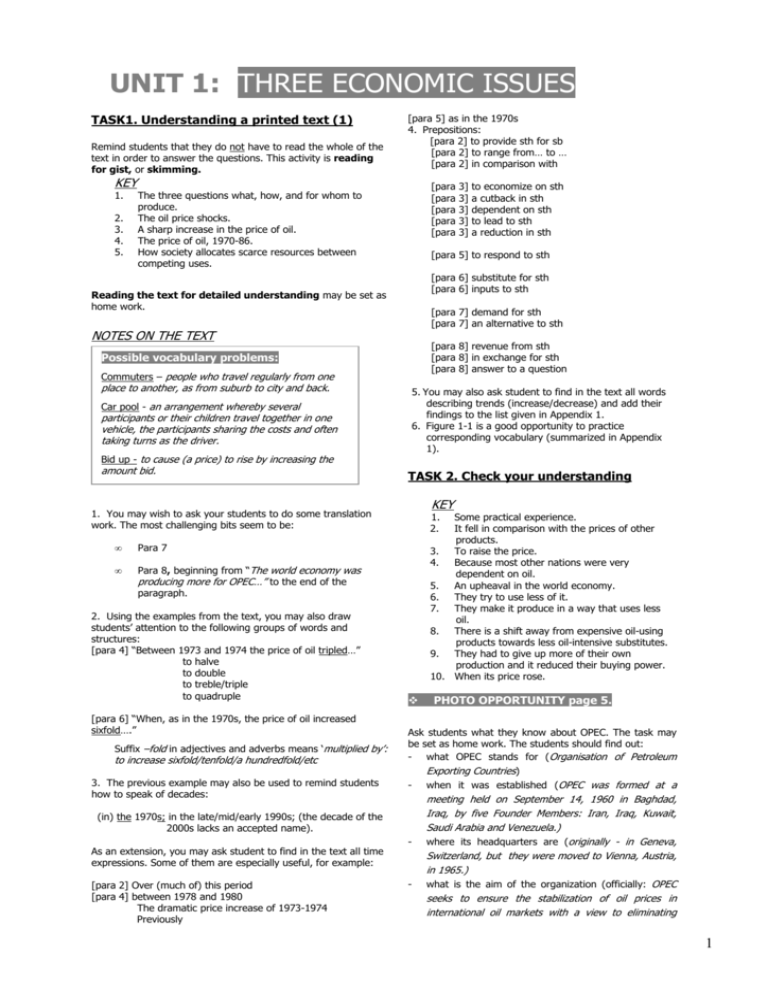Teacher's Book
advertisement

UNIT 1: THREE ECONOMIC ISSUES TASK1. Understanding a printed text (1) Remind students that they do not have to read the whole of the text in order to answer the questions. This activity is reading for gist, or skimming. [para 5] as in the 1970s 4. Prepositions: [para 2] to provide sth for sb [para 2] to range from… to … [para 2] in comparison with KEY 1. 2. 3. 4. 5. [para [para [para [para [para The three questions what, how, and for whom to produce. The oil price shocks. A sharp increase in the price of oil. The price of oil, 1970-86. How society allocates scarce resources between competing uses. [para 6] substitute for sth [para 6] inputs to sth [para 7] demand for sth [para 7] an alternative to sth NOTES ON THE TEXT [para 8] revenue from sth [para 8] in exchange for sth [para 8] answer to a question Possible vocabulary problems: Commuters – people who travel regularly from one Car pool - an arrangement whereby several participants or their children travel together in one vehicle, the participants sharing the costs and often taking turns as the driver. to economize on sth a cutback in sth dependent on sth to lead to sth a reduction in sth [para 5] to respond to sth Reading the text for detailed understanding may be set as home work. place to another, as from suburb to city and back. 3] 3] 3] 3] 3] 5. You may also ask student to find in the text all words describing trends (increase/decrease) and add their findings to the list given in Appendix 1. 6. Figure 1-1 is a good opportunity to practice corresponding vocabulary (summarized in Appendix 1). Bid up - to cause (a price) to rise by increasing the amount bid. TASK 2. Check your understanding KEY 1. You may wish to ask your students to do some translation work. The most challenging bits seem to be: • Para 7 • Para 8, beginning from “The world economy was producing more for OPEC…” to the end of the 1. 2. Some practical experience. It fell in comparison with the prices of other products. 3. To raise the price. 4. Because most other nations were very dependent on oil. 5. An upheaval in the world economy. 6. They try to use less of it. 7. They make it produce in a way that uses less oil. 8. There is a shift away from expensive oil-using products towards less oil-intensive substitutes. 9. They had to give up more of their own production and it reduced their buying power. 10. When its price rose. paragraph. 2. Using the examples from the text, you may also draw students’ attention to the following groups of words and structures: [para 4] “Between 1973 and 1974 the price of oil tripled…” to halve to double to treble/triple to quadruple [para 6] “When, as in the 1970s, the price of oil increased sixfold….” Suffix –fold in adjectives and adverbs means ‘multiplied by’: to increase sixfold/tenfold/a hundredfold/etc 3. The previous example may also be used to remind students how to speak of decades: PHOTO OPPORTUNITY page 5. Ask students what they know about OPEC. The task may be set as home work. The students should find out: - what OPEC stands for (Organisation of Petroleum Exporting Countries) - when it was established (OPEC was formed at a (in) the 1970s; in the late/mid/early 1990s; (the decade of the 2000s lacks an accepted name). As an extension, you may ask student to find in the text all time expressions. Some of them are especially useful, for example: [para 2] Over (much of) this period [para 4] between 1978 and 1980 The dramatic price increase of 1973-1974 Previously - meeting held on September 14, 1960 in Baghdad, Iraq, by five Founder Members: Iran, Iraq, Kuwait, Saudi Arabia and Venezuela.) where its headquarters are (originally - in Geneva, Switzerland, but they were moved to Vienna, Austria, in 1965.) what is the aim of the organization (officially: OPEC seeks to ensure the stabilization of oil prices in international oil markets with a view to eliminating 1 Unit 1 Three Economic Issues KEYS harmful and unnecessary fluctuations, due regard being 4.4 A. Explain the difference… given at all times to the interests of oil-producing nations and to the necessity of securing a steady income for them; wage - payment for labor or services to a worker, especially remuneration on an hourly, daily, or weekly basis an efficient, economic and regular supply of petroleum to or by the piece. consuming nations; and a fair return on their capital to those wages (Economics.) the portion of the national product that investing in the petroleum industry.) represents the aggregate paid for all contributing - country-members (The current Members are Algeria, labor and services as distinguished from the portion retained by management or reinvested in Indonesia, Iran, Iraq, Kuwait, Libya, Nigeria, Qatar, Saudi capital goods. Arabia, the United Arab Emirates and Venezuela.) salary - fixed compensation for services, paid to a - OPEC collective market share (supply about 40 per cent of person on a regular basis. the world's oil output, and possess more than three-quarters determine - to be the cause of; to regulate; to give of the world's total proven crude oil reserves) direction to - Russia – OPEC relationship identify - to establish the identity of; to ascertain the For more information go to http://www.opec.org origin, nature, or definitive characteristics of You may also ask student if they know the true causes of define -to state the precise meaning of (a word or sense the 1973 oil crisis (It began in earnest on October 17, 1973, of a word, for example); to describe the nature or basic qualities of; explain: when Arab members of the Organization of Petroleum Exporting Countries (OPEC), in the midst of the Yom Kippur War, announced that they would no longer ship petroleum to nations that had supported Israel in its conflict with Egypt—that is, to the United States and its allies in Western Europe. At around the same time, OPEC-member states agreed to use their leverage over the world price-setting mechanism for oil to quadruple world oil prices). For more information go to http://en.wikipedia.org/wiki/1973_energy_crisis TASK 3. PRONUNCIATION Docendo docimus, i.e make sure you yourself follow the RP rules! Note that Longman Pronunciation Dictionary considers pronunciation [rı`z s] to be RP, adding that BrE 1988 poll ` panel preference results were as follows: - z s - 45%, ‘•• - 6%. s - 50%, - `s TASK 4. Vocabulary work – Text 1 4.3 Give English equivalents to the following economic - economy ~ resources, ~ activity, ~ issue, ~ cycle, ~ incentives, ~ system, ~ variables, ~ efficiency, ~ theory, ~ stability, ~ choice, ~ growth, ~ regulation, ~ policy, political economy, national economy production ~ process, means of ~, ~ and consumption, to boost/raise/ increase ~, to expand ~, ~ costs, per head/per capita ~, commodity ~ regulation government ~, safety ~, private ~s, customs ~s, economic ~, currency exchange ~, environmental ~, financial ~s, market ~, price ~, trade ~s effective - producing a desired effect efficient - acting or producing effectively with a minimum of waste, expense, or unnecessary effort. B. Now, complete… 1. 2. 3. 4. 5. 6. 7. 8. 9. 10. effectiveness… efficiency… wages wages… salary rising determines identify raised define… identify efficient effective Peter Drucker, 1907-, American economist, b. Vienna, Austria. Drucker is best known as an authority on corporate management; among his ideas in the 1970s was the shift from traditional assembly lines to flexible production methods. He also helped found (1990) the Peter F. Drucker Foundation for Nonprofit Management. He has written more than 30 books, including The End of Economic Man (1939), Future of Industrial Man (1942), Concept of the Corporation (1946), The Practice of Management (1954), Management Challenges for the 21st Century (1999). 4.5 Use words… 1. 2. 3. 4. 5. 6. economics economy to economise economist economic economical 4.6 Use your dictionary to find derivatives… Students should come up with the following words: to consume – consumer – consumption – (consumerism) 2








